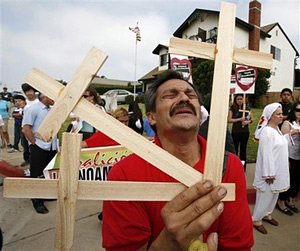 |
 |
 |
 News Around the Republic of Mexico | July 2006 News Around the Republic of Mexico | July 2006  
Apparent Mexican Winner Attacks Border Wall
 Manuel Roig-Franzia - Washington Post Manuel Roig-Franzia - Washington Post


| | Martin Rodriguez holds crosses meant to represent people who died while trying to cross the U.S.-Mexico border, during a protest at the front entrance to the U.S. Border Patrol Station, Imperial Beach, as a House subcommittee hearing was held at the station Wednesday, July 5, 2006, in Imperial Beach, Calif. People from both sides of the immigration debate protested at the hearings. (AP/Denis Poroy) |
Mexico City - Less than 24 hours after being named president-elect in a disputed official count, Felipe Calderón took a firm stance against building a wall along the United States-Mexico border to stem illegal immigration.

Echoing his campaign theme, Calderón said the best solution to the immigration crisis was creating jobs in Mexico, "not walls or troops," a reference to President Bush's decision to send National Guard troops to support the U.S. Border Patrol.

Calderón's remarks, delivered during his first post-election briefing for the international news media, angered a leading Capitol Hill proponent of increased border security. Rep. Tom Tancredo (R-Colo.) said in a phone interview that he was "insulted" by Calderón's statement, "just as Mexico would be rightly offended if we were to not only condemn their immigration policies but actively work to aid and abet illegal immigration."

Rep. Duncan Hunter (R-Calif.) another proponent of increased border fencing, said Friday in an e-mailed statement that he was "hopeful Mexico's president-elect will also look more closely at the benefits security fencing brings to both sides of the border."

The reaction presages what is likely to be one of the most contentious issues facing Calderón if his victory is upheld by the special elections court that will a hear a challenge of the results by his main opponent, Andrés Manuel López Obrador. Attempts by Mexican presidents to influence U.S. policy have often received frosty receptions. The outgoing president, Vicente Fox, failed to reach an immigration accord with the United States.

Immigration legislation in the U.S. Congress is stalled. The House of Representatives voted in December to build 700 miles of new fences along the border, and the Senate has voted to approve 370 miles of fencing. But neither proposal has been passed into law.

Calderón was declared the winner of Mexico's presidential race Thursday after an all-night count yielded an official tally that showed him half a percentage point, slightly more than 200,000 votes, ahead of López Obrador. López Obrador alleges that the vote was marred by numerous "inconsistencies," such as more votes being recorded than the number of ballots delivered at thousands of polling places. He plans to hold a rally Saturday in Mexico City's large downtown square, the Zocalo. On Friday, 1,000 of his supporters began a 60-mile march to Mexico City from the town of Pachuca.

Mexico's special elections court has until Sept. 6 to decided whether to certify the results. But Calderón is talking and acting as if his victory is assured On Friday, he said there was no doubt about the results and predicted he would work well with opposing parties, even though his National Action Party does not have a majority in the legislature. He also said he would not privatize Mexico's Pemex oil company.

Calderón also wants measures that will protect what he called "vulnerable" crops, such as corn and beans. López Obrador had vowed to defy provisions of the North American Free Trade Agreement that call for reducing tariffs on U.S. corn and beans. Many small Mexican farmers have said the reduced tariffs would put them out of business. Calderón said Friday he would not try to renegotiate the provisions. "The way the U.S. Congress is now," he said, "I don't see a large probability that the winner of the renegotiation would easily be Mexico."

Calderón said one of his first trips as president would be to the United States, where he wants to meet with Mexican Americans. More than 20.6 million people of Mexican origin live in the United States, representing 58 percent of the nation's Hispanic population, according to the U.S. Census Bureau. The Pew Hispanic Center says there are also 6.2 million Mexicans living in the United States illegally. | 
 | |
 |



